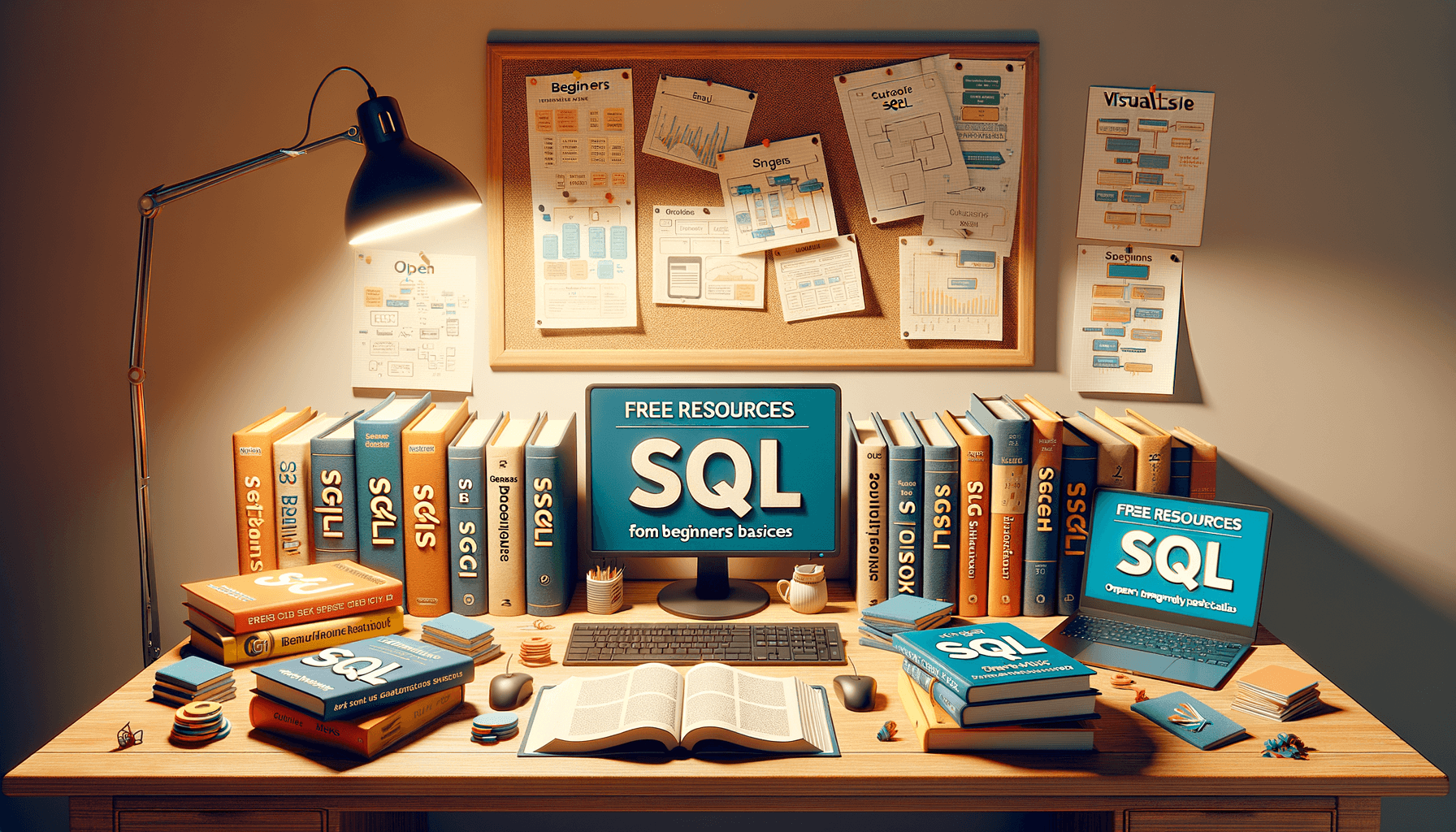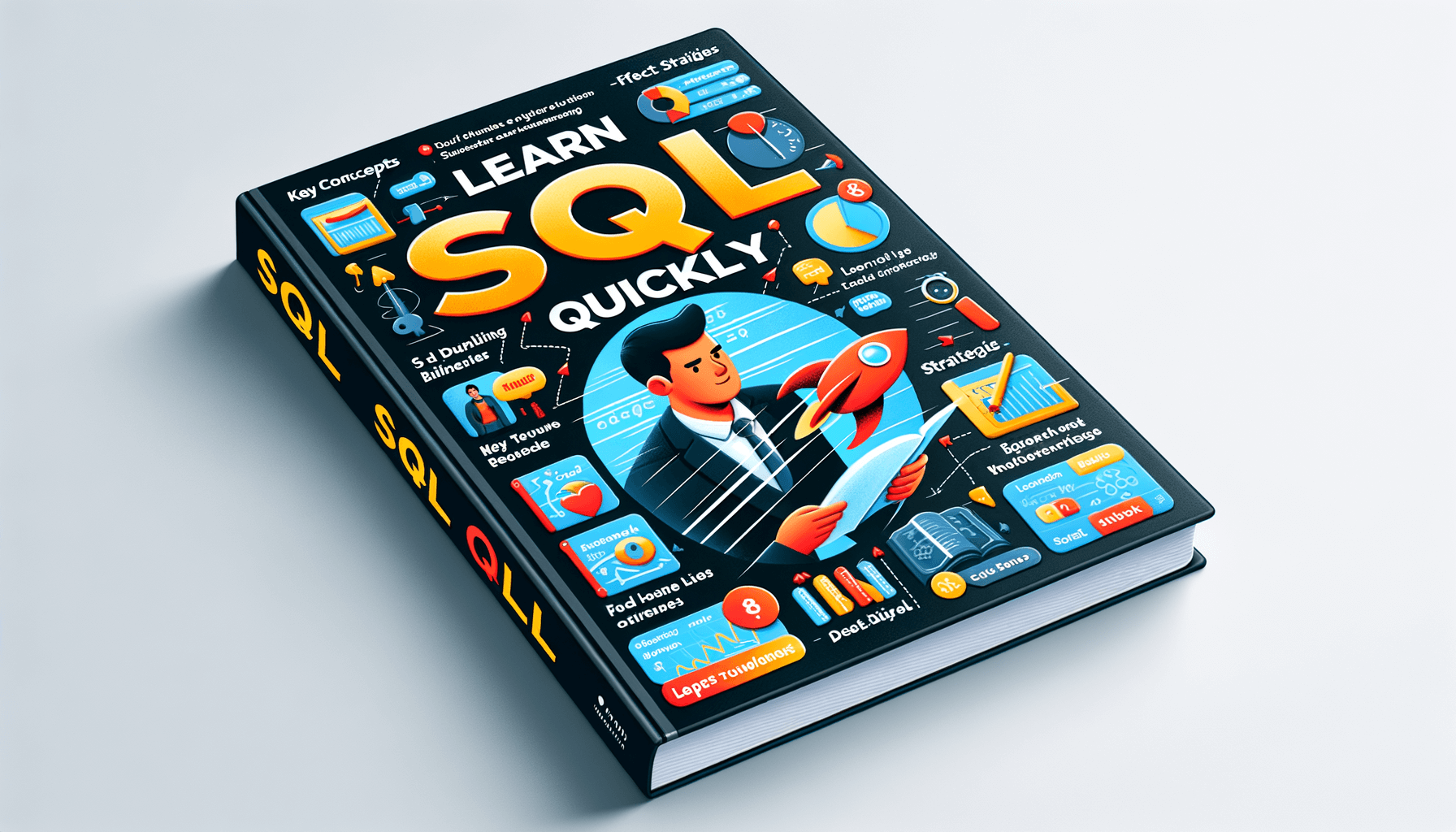A big variety of articles and resources

The Best Way to Learn SQL for Free: A Comprehensive Guide
 Sia Author and Instructor
Learn SQL
Sia Author and Instructor
Learn SQL
8 minute read
Learning SQL can open up a world of opportunities in data management and analysis. This guide will show you the best ways to learn SQL for free. We'll cover everything from basic concepts to advanced practices, all using free resources.
Key Takeaways
- Start with the basics of SQL to build a strong foundation.
- Use free online resources like courses and tutorials to learn SQL.
- Practice regularly on free SQL coding platforms to improve your skills.
- Explore open-source SQL tools and databases to get hands-on experience.
- Stay updated with the latest SQL trends and join the SQL community for support.
Understanding the Basics of SQL
What is SQL?
SQL, or Structured Query Language, is a standard language used to communicate with databases. It allows us to create, read, update, and delete data stored in a database. SQL is essential for anyone working with data because it provides a way to manage and manipulate large datasets efficiently.
Importance of SQL in Data Management
In the world of data management, SQL plays a crucial role. It helps us organize and retrieve data quickly, making it easier to analyze and make decisions. Whether you're working on a small project or managing a large database, knowing SQL is a valuable skill. For example, platforms like sqlskillz.com vs udemy.com offer courses that help beginners master SQL basics at their own pace.
Common SQL Commands
To get started with SQL, it's important to learn some common commands:
- SELECT: Retrieves data from a database.
- INSERT: Adds new data to a database.
- UPDATE: Modifies existing data in a database.
- DELETE: Removes data from a database.
These commands form the foundation of SQL and are used in almost every SQL query. By practicing these commands, we can build a strong understanding of how to interact with databases effectively.
Free Online Resources for Learning SQL
When it comes to learning SQL online, there are several resources available to us. These resources can help us grasp the fundamentals of SQL and improve our skills. One of the key resources is OpenCourseWare and University Lectures, which provide free access to educational materials from universities around the world. Another valuable resource is Interactive SQL Tutorials, which allow us to practice SQL queries in a hands-on manner. Additionally, SQL Learning Communities and Forums offer a platform for us to engage with other learners and seek help when needed. These resources can enhance our understanding of SQL and support our learning journey.
Utilizing Free SQL Practice Platforms
Hands-On SQL Coding Exercises
To truly grasp SQL, we need to practice writing and running queries. Hands-on exercises are essential for this. Many websites offer free coding exercises that let us write SQL queries and see the results instantly. This immediate feedback helps us understand what works and what doesn't.
SQL Challenge Websites
SQL challenge websites are another great resource. These platforms present us with real-world problems to solve using SQL. By working through these challenges, we can improve our skills and learn new techniques. Some popular sites include HackerRank and LeetCode.
Virtual Labs for SQL Practice
Virtual labs provide a simulated environment where we can practice SQL without needing to set up a database on our own computer. These labs often come with pre-loaded datasets and guided exercises. They are a great way to get hands-on experience in a controlled setting.
Practicing SQL in a variety of ways helps us become more confident and proficient in using the language. By utilizing these free resources, we can build a strong foundation in SQL without spending any money.
Leveraging Open-Source SQL Tools
Popular Open-Source SQL Databases
When it comes to learning SQL, using open-source databases can be a great way to get started. These databases are free and have large communities that offer support. Some popular options include MySQL, PostgreSQL, and SQLite. Each of these databases has its own strengths, making them suitable for different types of projects.
SQL Query Builders and Editors
To make writing SQL queries easier, there are several open-source query builders and editors available. Tools like DBeaver, HeidiSQL, and SQL Workbench/J provide user-friendly interfaces that help you write and test your SQL queries. These tools often come with features like syntax highlighting and auto-completion, which can be very helpful for beginners.
Community Support for Open-Source Tools
One of the best things about using open-source SQL tools is the community support. Forums, discussion boards, and online groups are great places to ask questions and get help. Websites like Stack Overflow and GitHub have active communities where you can find answers to your questions and learn from others. This community support can be invaluable as you work on your SQL skills.
Open-source tools not only save money but also provide a wealth of resources and support to help you learn SQL effectively.
Building Real-World SQL Projects
Designing a Sample Database
Creating a sample database is a great way to start. We can begin by identifying the data we need to store and how it relates to each other. This step involves sketching out tables and defining relationships. This foundational work helps us understand the structure and flow of data.
Implementing SQL Queries in Projects
Once our database is set up, we can start writing SQL queries to interact with it. This includes selecting, inserting, updating, and deleting data. Practicing these commands in real projects helps us see their practical use. We can also explore more advanced queries to solve complex problems.
Collaborating on Open-Source Projects
Working on open-source projects allows us to apply our SQL skills in a team setting. We can contribute to existing projects or start our own. This experience is invaluable for learning how to work with others and manage real-world data challenges. It also offers a chance to get feedback and improve our skills.
Engaging in hands-on projects, like the mastering PostgreSQL performance and query optimization course, offers practical SQL training with real-world problem-solving, hands-on projects, and expert-led instruction for career advancement in data management.
Staying Updated with SQL Trends and Best Practices
Following SQL Blogs and Newsletters
To keep up with the latest in SQL, we should subscribe to popular SQL blogs and newsletters. These resources often provide insights into new features, best practices, and industry trends. Staying informed helps us improve our skills and stay competitive.
Participating in SQL Webinars and Conferences
Webinars and conferences are excellent ways to learn from experts and network with other SQL professionals. Many of these events are free and offer valuable sessions on various SQL topics. We can also ask questions and get real-time answers from industry leaders.
Engaging with the SQL Community on Social Media
Social media platforms like Twitter and LinkedIn have active SQL communities. By following key influencers and participating in discussions, we can gain new perspectives and solutions to common problems. Engaging with the community also helps us stay motivated and inspired.
Keeping up with the latest SQL trends and best practices is crucial for anyone looking to excel in the tech world. Our website offers a variety of courses designed to help you stay ahead of the curve. Whether you're a beginner or an experienced professional, we have something for everyone. Visit our site today to explore our course catalog and start your journey towards becoming a SQL expert!
Conclusion
Learning SQL for free is not only possible but also quite achievable with the right resources and dedication. By following the steps outlined in this guide, you can build a strong foundation in SQL without spending any money. Remember to practice regularly, use online forums for help, and take advantage of free courses and tutorials. With time and effort, you will become proficient in SQL, opening up new opportunities in the tech world. Happy learning!
Frequently Asked Questions
What is SQL?
SQL stands for Structured Query Language. It's used to manage and manipulate databases.
Why is SQL important?
SQL is important because it helps you work with data. You can use it to store, update, and retrieve data from databases.
Where can I learn SQL for free?
You can learn SQL for free through online courses, tutorials, and community forums. Many universities also offer free lectures on SQL.
What are some common SQL commands?
Some common SQL commands are SELECT, INSERT, UPDATE, and DELETE. These commands help you manage the data in your database.
How can I practice SQL?
You can practice SQL on coding websites, through hands-on exercises, and by working on real-world projects.
What tools can I use to learn SQL?
You can use open-source SQL databases, query builders, and editors. These tools are often free and have community support.
Related Articles

Harnessing SQL for Machine Learning: A Comprehensive Guide
11 minute read

How Fast Can You Learn SQL? Tips for Rapid Mastery
8 minute read

Is it worth learning SQL in 2021-2022?
14 minute read




